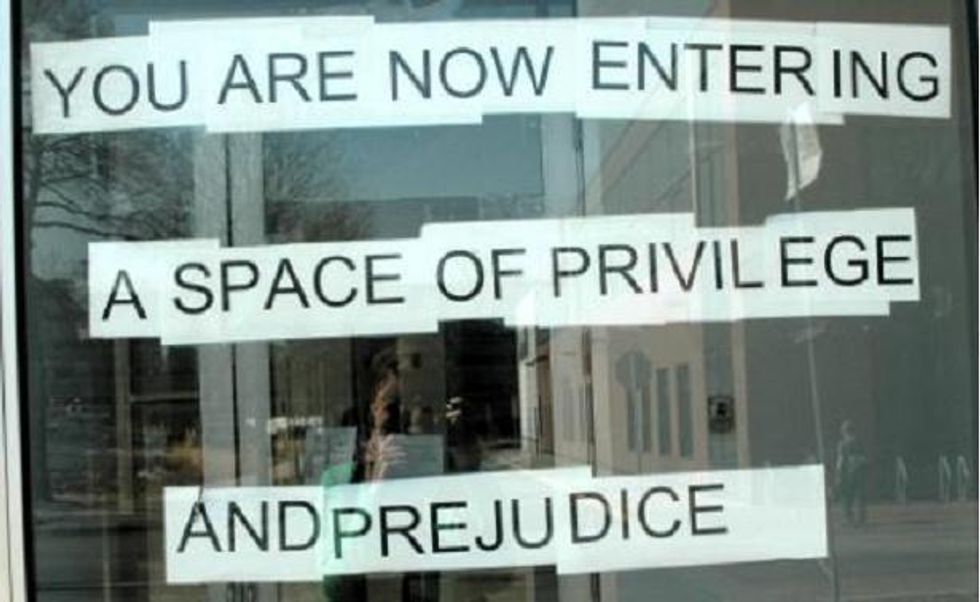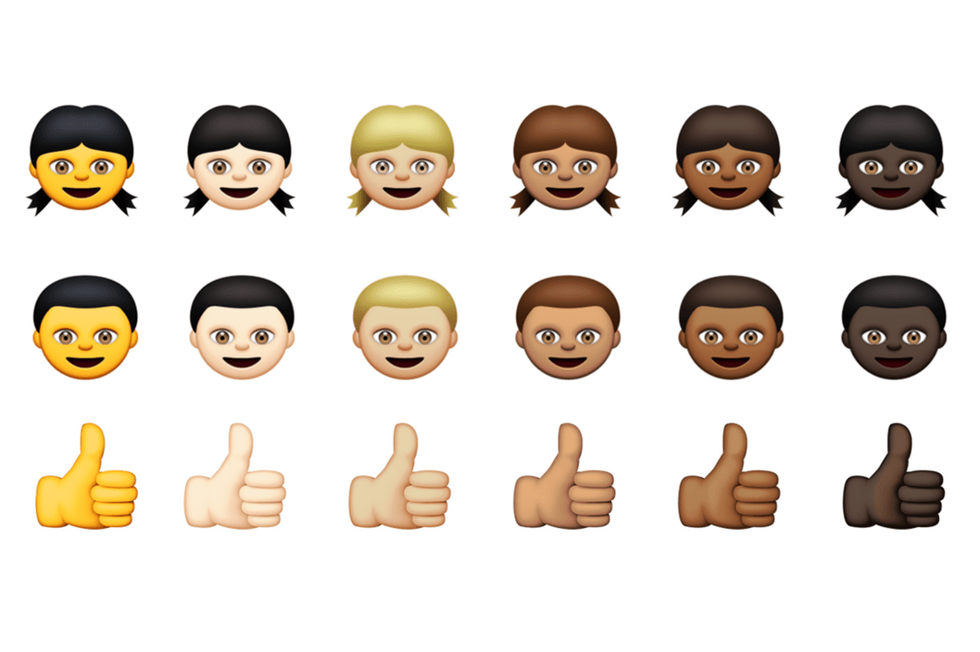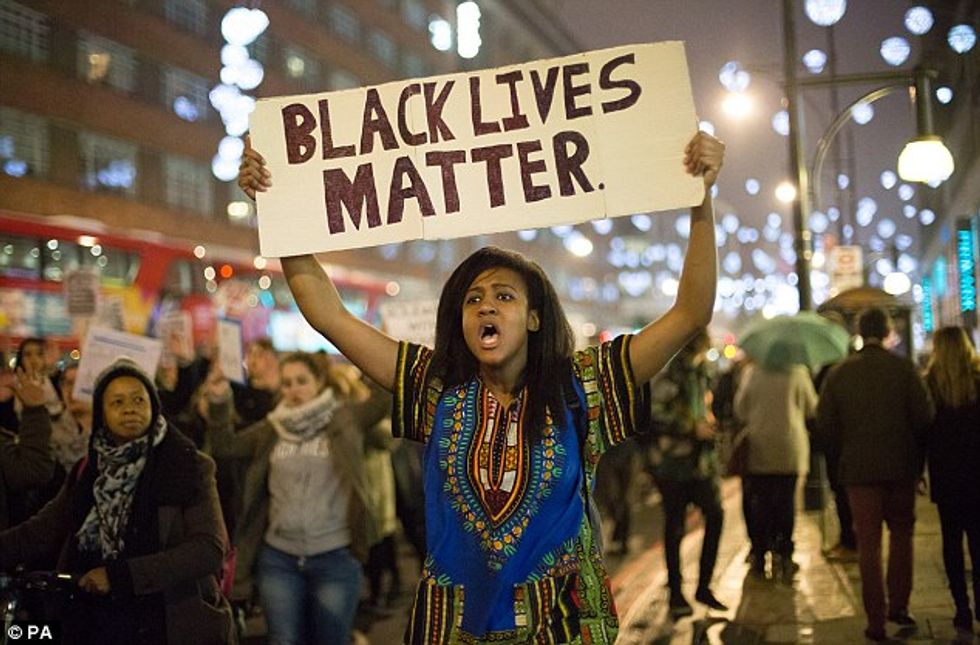This story begins exactly how one would expect it to.
I grew up in a small southern farming town. I was born and raised on a peach orchard, in a two-story house with a backyard and a white picket fence. Every person in my house was blessed enough to have their own car -- if you don't have a car where I'm from you don't go anywhere. Both of my parents worked full time, and they worked hard. Nothing we had was given to us. Everything was earned; but the condition in which I lived was not abnormal for my area, it was actually anything but that. It was not until I left the comfort of my home and traveled up north for school that I found that my life was different from many of my peers.
Moving up north was a big adjustment -- brand new and eye opening. I did not know at the time that I had stepped foot on what appeared to be one of the most culturally diverse campuses in the state. This is where I would learn about different African and Latino cultures and subcultures, and the first place I would see a woman wearing a Hijab.
I had not known that I was raised in a bubble until it was time for me to leave that bubble for a new life. The diversity and culture was welcoming, homey. I've never felt more safe on a college campus than I do at Montclair State University. My peers are of different races, religions, and sexes, and we all seem to get along beautifully. Just as our motto states- "It's All Here."
On the picture perfect outside you see a racially, ethnically diverse population of students who accept each other for who they are. On the surface we love our community, and we love being a part of it. But on the inside there is much more going on.
I did not know I was born with privilege until someone told me I was.
I did not feel any different from the Latin American and African children growing up in our community. We went to school together, played together, and grew up to date and fall in love with each other. We thought we had it all figured out. We did not know that we would all grow up to be different types of people, with different boundaries and different struggles. When we were little, we were all the same.
What exactly is White Privilege?
“White Privilege is the other side of racism. Unless we name it, we are in danger of wallowing in guilt or moral outrage with no idea of how to move beyond them. It is often easier to deplore racism and its effects than to take responsibility for the privileges some of us receive as a result of it … once we understand how white privilege operates, we can begin addressing it on an individual and institutional basis.” -Paula Rothenberg
White Privilege: the concept that white people have an advantage, solely because of their skin color. At this moment I will be speaking directly about the United States, although this is not a localized problem. This advantage can put someone in what is deemed to be a higher social class, and they may live a more secure and comfortable life than their peers with darker skin. White Privilege dates way back in history, and if you want to be bored with the horrific details you can take a United States history course.
Privilege did not feel good...it did not even feel real.
The first time I was made aware of my privilege was in high school. My ninth grade teacher told the class that if we were all around during the Holocaust, I would likely be the only one in the room to survive, thanks to my blue eyes, blonde hair, and fair skin. I did not enjoy winning at that game. It was not a comfort to know that if we had grown up in a different time period, all my peers would have been killed. It was not a comfort to be reminded that I genetically resembled and thus could serve as a visual representation of those from an earlier era, who attempted to murder people they felt were different than them. At that moment in my life, privilege did not feel good, it was not a comfort, it did not even feel real. Not to me at least. But not having it feel real to us, is part of the privilege.
Since the beginning of our lives some of us have been branded with this white privilege, but no one seems to know how we got it or what it means.
As Peggy McIntosh notes in her essay "White Privilege and Male Privilege," most white people are raised with the understanding that racism puts some at a disadvantage. What most privileged people do not understand is that while oppressing people of color, we whites are benefiting from racism.
Our country has recognized racism, and attacks the typical ways in which many minorities are struggling because of it, such as through job discrimination. What our country has yet to do is recognize how much the white race actually benefits from this racism. We, as a culture, have allowed ourselves to put down those that are different from us, and raised up the other races to become even more powerful than before.
Some may be thinking, "No, I am white, I am not a racist, nor do I see how I could in any way benefit from racism." It is this ignorance of privilege which allows the systematic oppression to continue; and also what allows people to ignore how they, as passive bystanders, play a role in this society. It is people like this who are to blame for the current existence of white privilege as we know it.
Since the beginning of my life, I, as many others, have been branded with this white privilege, but no one seems to know how we got it or what it means. When we were children none of us knew what white privilege was. There was never a discussion about it. We as white children might have thought that we were all created equal.
We all played on the playground together, we all bled when we fell and scraped our knee, so we must all be the same. Until a black child went to the nurse's office to get a Band-Aid for their cut, which would be “flesh colored”. But flesh colored Band-Aids would not match this child's skin. Band-Aids were created to blend in, and the creators deemed this creamy peach color to be the standard. We did not know when we were children that something so small as a Band-Aid could say so much about our world. We did not realize that not everyone had a Band-Aid to match their skin color.
In 2015, Apple finally blessed us with the option of racially diverse emojis, in almost every skin color you could imagine. IPhone emojis were first introduced during the 2.2 version, and people of color emojis were not created until version 8.3. With their original emojis, Apple not only excluded black people, but every skin color in between. Unless you were my skin color, almost white to the point of translucence, you did not have an emoji to represent you until the year 2015. This proves yet one of our most recent examples of white privilege.
For those who did not have an emoji to represent themselves prior to 2015, imagine what kind of impact that had on not only their ideas of self-worth but also their ideas of the quality of the company in which created these emoticons. Imagine spending upwards of $600 on your new cell phone, with cool new features, apps, and all at the touch of the button; to find that there is even cooler emojis to go along with it, but none of which can represent you.
Why would this company not create something to represent me? Am I not worthy of my own hair flip emoji? Why, when I express myself, must I do so in the imagery of a white person? What kind of message does this send to the consumer? Consumers of color may wonder, are there employees at this company, with skin such as mine, and could I ever have an opportunity of employment within this company? Am I not respected or valued by Apple, because I do not fit into the mold of their white person emoji lifestyle?
Assuming that the consumer is wrong, and there are indeed people of color working for Apple, then we are to believe that they are working for a company which may not value them enough to depict them in their software. And for those working for Apple, why did it take so long for this to happen? How many discussions were had among executives before they finally realized that they had managed to piss off most of their targeted audience?
Alas, the year 2015 has come and we are all finally equal in the eyes of Apple. But let us not forget that it was just a few short months ago where not even Beyonce or President Obama could be represented via emojis.
I have the privilege to turn on the TV and expect to see people who look like me in the media. White children can easily find someone they can physically relate to in the successful working world. White children are never asking "Mommy, why are there no girls on TV like me?" White girls can turn on just about any show and see a white actor/actress as the main character, not in a supporting role. What does this show about our culture, and what is this teaching our youth?
I never asked to be born white.
Just like I never asked to be born cisgendered into a hard working middle class family speaking a language that is nationally recognized.
While I never asked to be born white, I was. As a child I was able to color pictures of myself to hang on the fridge using a "flesh" colored Crayola crayon. I never once had to question why Band-Aids didn't match my skin tone. I was raised to see successful women in the media who looked just like me and I aspired to be them one day.
I never knew I was born with white privilege, until someone told me. Ignorance is not bliss, and we are all privileged in one way or another. I am here to tell you that if you are white, naturally born with less pigmentation in your skin, that is a privilege. While you may not have asked for it, and you may not feel that you benefit from it, know that you do.
If I don't want to be privileged, and you don't want me to be, then why am I?
If many of us white people are not enjoying the graces of our privilege, and people of color are at a disadvantage due to their lack of privilege, then why is it still happening?
Since I was a teenager, I felt that I had been placed on a pedestal by everyone around me, black, white, and all in between. I had been told many times that I had the most beautiful skin anyone has ever seen. I didn't know all the trouble that would be caused by that beauty.
White privilege has existed for hundreds of years, and simply being aware of its presence is not enough to end it. Many people are ignorant enough to believe that just because they are aware of their privileges, it takes away the harmful power that they were once granted. We now know that this does not hold to be true.
Ending white privilege once and for all.
Nobody said it would be easy, but we can make the dream more achievable. Ways that white people increase their privilege include, ignorance, cultural appropriation, power, and neglect. I'm not writing this article in expectations that white people everywhere will begin turning down opportunities in fear that they are using their privilege unfairly. I am writing this article for Americans everywhere to move forward, not one in front of the other but all of us side by side. There are many things you can do to help.
Stop #AllLivesMatter
All lives do matter. Which is why #BlackLivesMatter is so important right now. You wouldn't go to a Susan G. Komen walk and criticize them for excluding colon cancer fundraising. To say #AllLivesMatter is saying that you are actively ignoring the racism, hatred, and oppression that is happening to our fellow citizens. #AllLivesMatter is insinuating that you don’t care about racial profiling or that there is a disproportionate amount of people of color who are arrested, charged and killed as a result of police brutality. To say #BlackLivesMatter or even #NativeLivesMatter shows that you care about the lives of others and it advocates for attention on this matter.
Stand up and show your support
If you have white privilege, you have the ability to use it for good. When you hear your friends making racist jokes, question and ask why they are funny. Support and share things you find on Facebook or on Twitter. Don’t be afraid to show your support, because when you make a public stand you not only show support for the movement, but you are also using your voice to educate those around you to find out more information and to create a safe space for discussion.
Most importantly, listen. No one is asking you to be an all knowing civil rights anti-oppression master, but what you can do is listen to their stories, their struggles, and their movements. When you are done listening ask how you can help. It is your burden to remove yourself from ignorance.
Not sure what to do next? Here a few places to help you get started:
Alexis M. Rachel D. Sophonie M.


























